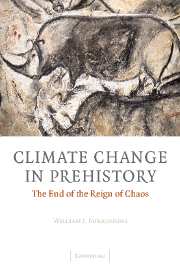Book contents
- Frontmatter
- Contents
- Preface
- Acknowledgements
- 1 Introduction
- 2 The climate of the past 100 000 years
- 3 Life in the ice age
- 4 The evolutionary implications of living with the ice age
- 5 Emerging from the ice age
- 6 Recorded history
- 7 Our climatic inheritance
- 8 The future
- Appendix Dating
- Glossary
- References
- Bibliography
- Index
6 - Recorded history
Published online by Cambridge University Press: 06 August 2009
- Frontmatter
- Contents
- Preface
- Acknowledgements
- 1 Introduction
- 2 The climate of the past 100 000 years
- 3 Life in the ice age
- 4 The evolutionary implications of living with the ice age
- 5 Emerging from the ice age
- 6 Recorded history
- 7 Our climatic inheritance
- 8 The future
- Appendix Dating
- Glossary
- References
- Bibliography
- Index
Summary
‘My name is Ozymandias, king of kings
Look on my works, ye Mighty, and despair!'
Nothing beside remains. Round the decay
Of that colossal wreck, boundless and bare
The lone and level sands stretch far away.
Percy Bysshe Shelley (1792–1822) OzymandiasMoving on to recorded history takes us beyond the simple matter of looking for instances of disruptive climate change that appear to have influenced the pace of human development. We now have the parallel written record that may contain valuable support for theories of the impact of climate change on the fortunes of early civilisations. This includes texts, inscriptions on monuments and stele, which could contain direct references to adverse conditions (e.g. drought, harvest failures and famine). More frequently, we have to rely on indirect evidence in the form of the dating of major events that marked the downfall of civilisations and the cessation of written records. Often these collapses are identified by the abandonment of cities and towns in terms of artefacts found on the sites.
An additional feature of this complementary analysis is that it seeks to explain the rise of ancient civilisations in terms of their particular resource advantages. Where climatic factors loom large, as in the case of Mesopotamia and Egypt, this complementary approach is central to the whole analysis. The first step is to establish for these civilisations, where climatic circumstances were particularly auspicious, the criteria for success.
- Type
- Chapter
- Information
- Climate Change in PrehistoryThe End of the Reign of Chaos, pp. 236 - 260Publisher: Cambridge University PressPrint publication year: 2005



